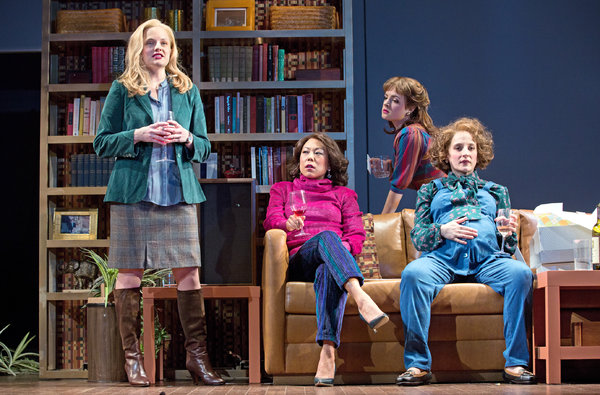

The Broadway revival of Wendy Wasserstein's 1988 Tony Award/Pulitzer Prize Award-winning play, The Heidi Chronicles, still raises sensitive points, especially for women. With wit and poignancy, Wasserstein balanced the zeitgeist of American women in the 60's and '70's, demanding equal choices, smashing that glass ceiling and quashing the cultural roles. By the late 1980's, many of the inequities had become part of history. Many, but not all.
Heidi Holland (Elizabeth Moss), a sharp and quick-witted Baby Boomer who grew up in the '50's, began chronicling her journey in 1965. Directed by Pam MacKinnon, Moss brings to Heidi aspects of her portrayal of Peggy from “Mad Men.” With a similar accessibility and vulnerability, Heidi has a plaintive smile, wears unflattering clothes, and harbors a fierce ambition that reflects her life in the hyped-up years from 1965 through 1988.
As the play opens, Heidi has become an acknowledged art historian before an early flashback takes her back to a school dance. Sixteen-years-old, brainy and insecure, she is dragged to the dance by her spicy best friend, Susan (Ali Ahn). There, Heidi meets one of the two most important men in her life, Peter Patrone (Bryce Pinkham, of A Gentleman’s Guide to Love and Murder). As sharp and quick-witted as she, Peter is far more outgoing and is the most engaging character in the play. Peter later becomes a pediatrician, admits he is gay, and turns out to be her best friend. He continues to spark up the stage as the buddy Heidi can always turn to but at the end, he reveals his own personal despair when he admits his struggles during the era of AIDS.
In 1968, Heidi meets Scoop Rosenbaum (Jason Biggs from Netflix's “Orange is the New Black”) at a political rally for Eugene McCarthy and although he continues to irritate her, they slowly develop a love/hate relationship.
Heidi's path is deliberate and steady as she steps toward her goals, observant as her friends storm through Consciousness Raising Rap Groups, the "Me" Generation and marrying, having babies and moving to the suburbs. Susan jumps right on the fast track and is especially amusing in a luncheon scene after she has become a media hotshot, keeping an eye on her watch and on the door. Heidi's other women friends play multiple roles: Tracee Chimo (Bad Jews), Leighton Bryan (Cat on a Hot Tin Roof) and Elise Kibler.
MacKinnon's direction highlights the personalities while Peter Nigrini's projections of passing years stream against John Lee Beatty's spare white backdrop. Key moments ring true. In 1980, for example, at her older sister's baby shower, Denise asks the group, "Isn’t that what you guys fought for? So we could 'have it all.'” Yet, "having it all," which does not make sense anyway, does not usually fulfill its promise and often results in loneliness and dissatisfaction.
As outrageous as her friends often are, Heidi is more often critical of herself. She sounds strangely whiny during a despondent moment in a locker room full of women. "We’re all concerned, intelligent, good women. (Pause.) It’s just that I feel stranded. And I thought the whole point was that we wouldn’t feel stranded. I thought the point was we were all in this together."
At the end, Heidi settles into her new apartment with a new adopted baby. As she cradles her baby, she remembers the early years and softly croons, "You Send Me."
We've come a long way but not long enough. In 2015, The Heidi Chronicles still serves as a realization that issues and inequities remain.
